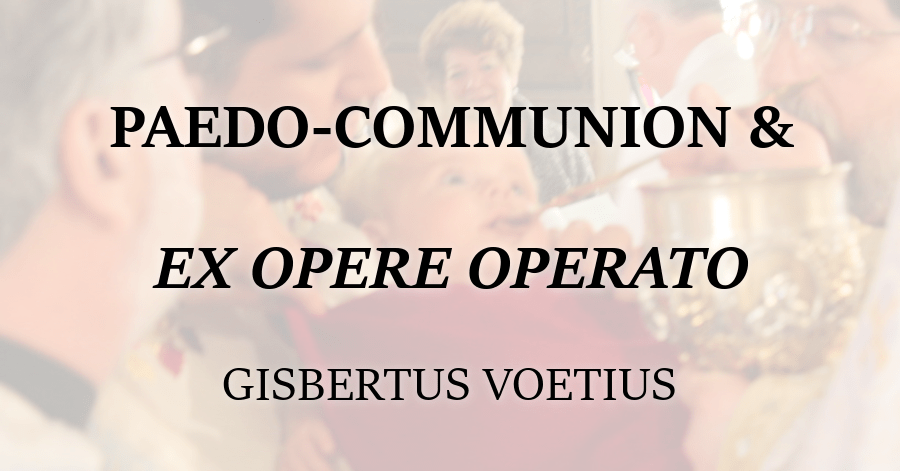
Gisbertus Voetius (1539-1676)
Ecclesiastical Politics, vol. 1, 2.2.4, ch. 3, pp. 757-758.
Translated by Charles Johnson
6. Question. Is the supper to be granted to infants, or to children?
Resp. I. Regarding infants, it is absolutely denied for this one reason, that they are not able to examine and search themselves, nor do they have actual repentance, faith, new obedience, or a proclaiming of the death of the Lord, concerning which things they must search themselves. But both the latter and the former are a necessary requirement (1 Cor. 11:16, 28-31). Johannes Stephanus Durantus does not incorrectly argue that this paedocommunion “appears to be foreign to the institution of Christ, for Christ says ‘take and eat.’ Infants, rather, are not able recipients, who take and eat.”
Hence, we weigh that pitiful doctrine [1] of the ancients concerning the necessity of the eucharist for infants from John 6:53. See Cyprian, Tract. de Lapsis, and Augustine Ep. 23 ad Bonifacium. For, that it was used in practice is clear from the Roman church order, from which Abruinas Flaccus, Lib. de divinis Officiis, cap. de Sabbatho Paschae (which Durantus referenced in the cited place), notes that “care is to be taken that the infants do not breastfeed, or receive any bread, before they partake of communion.” He adds, ibid., that the same custom is still in force among the Greeks. Concerning which I do not inquire now. Maldonatus on Jn. 6:53 judges that Innocent I and Augustine thought that the eucharist was necessary for infants, and that “this doctrine of theirs was in force in the church for about six hundred years”. With Suarez, disp. 62, sect. 4, many other testimonies of the Greek and Latin fathers respecting said custom are provided.
From this and many others, let the Papists and others zealous for ancient things [2] learn that we are not to prefer custom without truth to the very truth, since custom without truth is nothing but antiquity of error; and from them, who in the Council of Trent, Sess. 21, Can. 4, struck with an anathema this doctrine of the ancients concerning the necessity of the eucharist for infants. Which, nevertheless, Ariaga, Disp. 43, Sect. 1, disputes seriously for the usefulness of paedocommunion, or that infants are capable of receiving the fruit of the eucharist, saying that this is the common sentence of the doctors, citing for this from his friends Vasquez, Suarez, and Tanner. This assertion is supported by the hypothesis, which Ariaga explains there, that the sacraments (except marriage and penitance) cause grace ex opere operato, and do not require any acts of the recipient as an essential part. He inquires, ibid. §. 7, whether paedocommunion is now prohibited, and he concludes that no text was so far supplied by them according to which it should be prohibited. Therefore, the whole reason of the prohibition is to be reduced to a long custom approved by the church, which it ritually handed down to parish priests in the time of Paul V, and “that prohibition was probably made when the use of the cup was forbidden to the laity”.
2. Resp. As concerning children, we cannot bind all to the same measure of age. For there are some in whom spiritual knowledge, study and zeal for piety, and grave and well-ordered morals supply the defect of years. Yet it is not in the least to be approved that each and all alike, after the age of fourteen, initiated with the sacrament of confirmation (according to the Papists) or a quasi-sacrament, or μυστηριοειδεῖ (according to others), are received to communion. In the ancient church (as the Papists judge), that anointing which they call the sacrament of confirmation was conferred immediately after baptism. Ariaga, ibid., sect. 3, treats this question of when the obligation to partake begins in children, and having related the sentences of others of age 10 or 12, he concludes that it is to be left to the judgment of the prudent confessor. In the same place, he lays out their vicious contentions regarding the question of whether all children capable of reason and sin must receive the eucharist at the moment of death. And sect. 4, regarding the question of whether the viaticum is to be given when there are doubts concerning the capacity of the child. But we are onlookers here, we who abstain from private communion, whether at the moment of death, or at any other time.
[1] θεολογούμενον. cf. Matthew Winzer, The True History of Paedo-Communion, Confessional Presbyterian Journal 03 (2017), pp. 27-36.
[2] τῶν ἀρχαίων

[…] that Paedocommunionists do not intend to imply an ex opere operato mechanism of sacramental efficacy, the only perceived benefit of admitting infants to the Table […]
LikeLike
[…] 假設允許嬰兒領餐的人並不打算暗示一種「因功生效」(ex opere operato)的聖禮效力的機制,那麼允許嬰兒領餐的唯一好處就是承認他們是盟約團體的客觀(外在)成員。然而,盟約孩童在受洗時已經享有這個好處。因此,在急切地想要強調這個好處時,父母與孩童領餐論者就無意中破壞並貶低了洗禮的重要性,並將洗禮視為不足以達到基督所定旨的目的。 […]
LikeLike